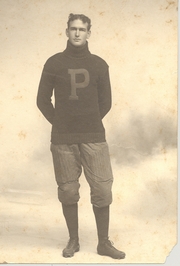Garfield Weede

Weede, suited up for football at Penn
|
|
| Sport(s) | Football, basketball |
|---|---|
| Biographical details | |
| Born |
November 26, 1880 Burlington, Iowa |
| Died | November 21, 1971 (aged 90) Wichita, Kansas |
| Playing career | |
| Football | |
| 1901–1904 | Penn |
| Position(s) | End, placekicker |
| Coaching career (HC unless noted) | |
| Football | |
| 1906–1908 | Washburn |
| 1910–1918 | Cooper Memorial |
| 1919–1928 | Pittsburg State |
| Basketball | |
| 1919–1922 | Pittsburg State |
| Head coaching record | |
| Overall | 87–64–13 (football) 30–32 |
| Accomplishments and honors | |
| Awards | |
|
Kansas Sports Hall of Fame Walter Camp All-American Team, 1904 NAIA Track and Field Hall of Fame |
|
Garfield Wilson Weede (November 26, 1880 – November 21, 1971) was an American football, basketball, and track and field coach and athletic director. He was one of the first college coaches to "break the color line" and allow racial integration among his players.
Garfield Weede played football at the University of Pennsylvania as an end and placekicker. He was severely injured in a game on October 1905. Under head coach Carl S. Williams, the team was undefeated in 1904 with a record of 12–0 and has since retroactively been declared "national champions" for that year.
Weede was the tenth head football coach for Washburn University in Topeka, Kansas. He held the position for three seasons, from 1906 until 1908, and followed John H. Outland. Weede's coaching record at Washburn was 20–6–4. Football legend Walter Camp called him a "familiar winner" in one of his reviews of the program and his 1907 team finished the season undefeated and untied with victories of Kansas State, Kansas, and Oklahoma.
Weede next became the head football coach at Cooper Memorial College—now known as Sterling College—in Sterling, Kansas. He held that position for nine seasons, from 1910 until 1918. His coaching record at Cooper Memorial was 21–25–3.
In 1919, "Doc" Weede was hired as coach of all sports and director of athletics at Pittsburg Manual Training Normal in Pittsburg, Kansas. He coached the football team to a 46–33–6 record from 1919 to 1928 including the school's first undefeated team in 1924. That year, his team was declared Kansas Collegiate Athletic Conference champions.
...
Wikipedia
